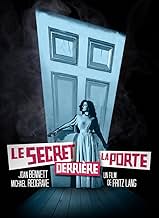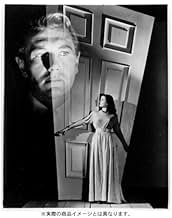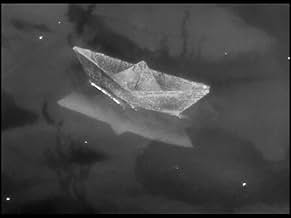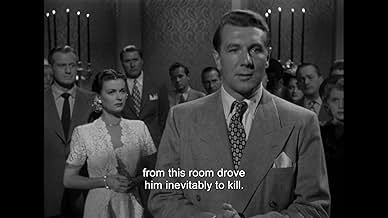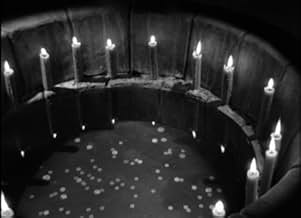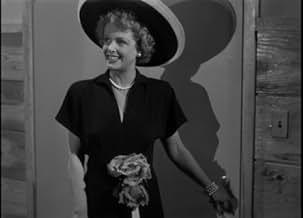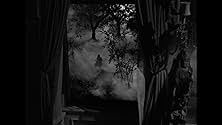VALUTAZIONE IMDb
6,6/10
6153
LA TUA VALUTAZIONE
Una bella donna e il suo nuovo marito si stabiliscono in un'antica villa sulla costa orientale.Una bella donna e il suo nuovo marito si stabiliscono in un'antica villa sulla costa orientale.Una bella donna e il suo nuovo marito si stabiliscono in un'antica villa sulla costa orientale.
Robert Barber
- Altar Boy
- (non citato nei titoli originali)
Ray Beltram
- Townsman
- (non citato nei titoli originali)
Virginia Brissac
- Sarah
- (non citato nei titoli originali)
Ralph Brooks
- Guest in Home Tour
- (non citato nei titoli originali)
Albert Cavens
- Guest in Home Tour
- (non citato nei titoli originali)
Tom Chatterton
- Judge
- (non citato nei titoli originali)
David Cota
- Small Mexican Knife Fighter
- (non citato nei titoli originali)
Frank Dae
- Country Squire
- (non citato nei titoli originali)
Recensioni in evidenza
Fritz Lang's creepy and atmospheric psychological thriller, 'Secret Beyond the Door (1948),' faces just one major obstacle that prevents it from being a completely satisfying film experience: the story is quite obviously derived from Hitchcock's 'Rebecca (1940),' which happens to be a superior film in almost every regard. This is not to question the talents or originality of Lang, since, of course, he was already an established director before Hitchcock ever got his break, but you can just tell how much this particular work was influenced by the Master of Suspense. Borrowing elements from the then-prevalent film noir movement, and adding shades of post-marriage paranoia from the likes of 'Rebecca' and Cukor's 'Gaslight (1944),' Lang also mixes in snippets of Freudian psychoanalysis, not unlike what I witnessed last week in Hitchcock's own 'Spellbound (1945).' The final product is not without its charm, and contains various moments of precisely-articulated suspense, but you can never overcome that niggling feeling that you've seen it all done better.
Joan Bennett plays Celia, a young lady who acquires a large amount of money after her brother's death and decides to take a holiday. It is here that she meets Mark Lamphere (Michael Redgrave), a mysterious and charming gentleman who excites in Celia intense suppressed feelings of rebellion and exhilaration. Following their marriage, a hastily-decided proposition that can only lead to trouble, Celia immediately begins to notice peculiarities in her new husband, and, after her arrival at Mark's extravagant residence, she finds the dwelling haunted by the shadow of his previous wife. Mark, it seems, houses an unhealthy preoccupation with murder, and has made a hobby out of collecting entire rooms in which unspeakable atrocities of passion were committed. But what of the one room that is kept securely locked, never to be opened by anyone? Celia concludes that the secret to unlocking the inner depths of her husband's disturbed mind lies within that single room, beyond the forbidden door. Though Silvia Richards' screenplay, from a story by Rufus King, often seems too incredible to take seriously, Lang's film remains an interesting achievement, and is nothing if not entertaining.
I found the promotional material for 'Secret Beyond the Door' to be grossly misleading. The image of Joan Bennett standing before a significantly-distorted door prompted me to expect a film of extreme German Expressionism, in the same vein as 'The Cabinet of Dr. Caligari (1920).' Fritz Lang, who developed his career in Germany during the 1920s, and having often used elements of the style, would presumably have been very adept at recreating the devilishly-twisted labyrinths of the human mind, but the only scene to even approach my stylistic expectations was the appropriately ambiguous and shadowy dream sequence, in which Michael Redgrave both prosecutes and defends his malevolent tendencies in court {this particular scene may even have influenced Hitchcock's heavily-stylised courtroom trial in 'Dial M for Murder (1954)}. The remainder of the film has the appearance of a typical 1940s film noir, with suitably shadowy cinematography by Stanley Cortez, supplemented by a voice-over by Joan Bennett. Also note the similarity between the character of Miss Robey (Barbara O'Neil) and Mrs. Danvers (Judith Anderson) from 'Rebecca,' most particularly in their respective final actions in each picture.
Joan Bennett plays Celia, a young lady who acquires a large amount of money after her brother's death and decides to take a holiday. It is here that she meets Mark Lamphere (Michael Redgrave), a mysterious and charming gentleman who excites in Celia intense suppressed feelings of rebellion and exhilaration. Following their marriage, a hastily-decided proposition that can only lead to trouble, Celia immediately begins to notice peculiarities in her new husband, and, after her arrival at Mark's extravagant residence, she finds the dwelling haunted by the shadow of his previous wife. Mark, it seems, houses an unhealthy preoccupation with murder, and has made a hobby out of collecting entire rooms in which unspeakable atrocities of passion were committed. But what of the one room that is kept securely locked, never to be opened by anyone? Celia concludes that the secret to unlocking the inner depths of her husband's disturbed mind lies within that single room, beyond the forbidden door. Though Silvia Richards' screenplay, from a story by Rufus King, often seems too incredible to take seriously, Lang's film remains an interesting achievement, and is nothing if not entertaining.
I found the promotional material for 'Secret Beyond the Door' to be grossly misleading. The image of Joan Bennett standing before a significantly-distorted door prompted me to expect a film of extreme German Expressionism, in the same vein as 'The Cabinet of Dr. Caligari (1920).' Fritz Lang, who developed his career in Germany during the 1920s, and having often used elements of the style, would presumably have been very adept at recreating the devilishly-twisted labyrinths of the human mind, but the only scene to even approach my stylistic expectations was the appropriately ambiguous and shadowy dream sequence, in which Michael Redgrave both prosecutes and defends his malevolent tendencies in court {this particular scene may even have influenced Hitchcock's heavily-stylised courtroom trial in 'Dial M for Murder (1954)}. The remainder of the film has the appearance of a typical 1940s film noir, with suitably shadowy cinematography by Stanley Cortez, supplemented by a voice-over by Joan Bennett. Also note the similarity between the character of Miss Robey (Barbara O'Neil) and Mrs. Danvers (Judith Anderson) from 'Rebecca,' most particularly in their respective final actions in each picture.
Pseudo-Hitch intriguing drama about a woman who gradually realizes she is married to a killer and may be next on his list .This classic suspense film contains emotion , intrigue , chills, and evocative scenarios . When a lovely as well as wealthy heiress named Celia (Joan Bennett) spends a fun holiday she meets a good-looking guy called Mark Lamphere and ends up falling in love with him . Later on , she marries the widower (Michael Redgrave's first American film) and finds out weird happenings about him . She and her new husband, settle in an ancient mansion on the East coast, she discovers he may want to kill her . Understandably , she wonders what plans he might have for her . The mansion has got a lot of rooms that are replicas of known murder sites . In the tour of the three rooms, Mark Lamphere recounts the tales of three murders, all of which are fictional. However in the first room, he mentions the St Bartholomew's Day massacre and the Guise family in France. The massacre is a real historical event, where French Roman Catholics attacked French Huguenots (Protestants) on 24th of August 1572 resulting in many deaths.
Dazzling Hitch/style suspense movie about a beautiful woman marries a rare man with a shock revelation around every corner their mansion . It packs hallucination , treason , Bennett plays a rich wife trying to help her hubby , well played by Michael Redgrave , who is suffering from amnesia and who might be a murderer too . The picture takes elements from classic Hitchcock films , carrying out a crossover among ¨Suspicion ¨, ¨Spellbound¨ and ¨Rebeca¨ . In fact ,Fritz Lang's attempt to do his version of Rebeca (1940) was a project fraught with disaster. It ran over budget and over schedule, while Lang was at constant loggerheads with his leading lady, Joan Bennett . As it stars the great Joan Bennett , being compellingly directed by Lang ; but it is not as outstanding as their former movies together : ¨Man hunt¨, ¨The woman in the window¨ and ¨Scarlet street¨. Support cast is pretty good such as Anne Revere as Caroline Lamphere , Barbara O'Neil as Miss Robey and Paul Cavanagh as Rick Barrett .
Atmospheric as well as mistly cinematography in black and white by Stanley Cortez . Thrilling and frightening musical score by the classic Miklos Rozsa . The motion picture was professionally directed by Fritz Lang . Lang directed masterfully all kind of genres as Noir cinema as ¨Big heat , Scarlet Street and Beyond a reasonable doubt¨ , Epic as ¨Nibelungs¨, suspense as ¨Secret beyond the door, Clash by night¨ , Western as ¨Rancho Notorious and Return of Frank James ¨ and of course Adventure as ¨Moonfleet¨ .
Dazzling Hitch/style suspense movie about a beautiful woman marries a rare man with a shock revelation around every corner their mansion . It packs hallucination , treason , Bennett plays a rich wife trying to help her hubby , well played by Michael Redgrave , who is suffering from amnesia and who might be a murderer too . The picture takes elements from classic Hitchcock films , carrying out a crossover among ¨Suspicion ¨, ¨Spellbound¨ and ¨Rebeca¨ . In fact ,Fritz Lang's attempt to do his version of Rebeca (1940) was a project fraught with disaster. It ran over budget and over schedule, while Lang was at constant loggerheads with his leading lady, Joan Bennett . As it stars the great Joan Bennett , being compellingly directed by Lang ; but it is not as outstanding as their former movies together : ¨Man hunt¨, ¨The woman in the window¨ and ¨Scarlet street¨. Support cast is pretty good such as Anne Revere as Caroline Lamphere , Barbara O'Neil as Miss Robey and Paul Cavanagh as Rick Barrett .
Atmospheric as well as mistly cinematography in black and white by Stanley Cortez . Thrilling and frightening musical score by the classic Miklos Rozsa . The motion picture was professionally directed by Fritz Lang . Lang directed masterfully all kind of genres as Noir cinema as ¨Big heat , Scarlet Street and Beyond a reasonable doubt¨ , Epic as ¨Nibelungs¨, suspense as ¨Secret beyond the door, Clash by night¨ , Western as ¨Rancho Notorious and Return of Frank James ¨ and of course Adventure as ¨Moonfleet¨ .
Highly derivative this low-budget film noir thriller may be but with Fritz Lang at the helm, you forget the ridiculous plot and admire instead the cinematography and atmosphere he brings to proceedings. And when I say ridiculous, I mean it, how else to describe a storyline where a widowed architect marries a wealthy city girl and takes her to his big old house in the country where he's made over a number of the rooms into murder tableaux. You might think she'd look for the door marked "Exit", but no Joan Bennett herself gets obsessed with the one room he's locked up, the mysterious number 7 and before too long is making a copy of the key, so she can investigate, naturally at the dead of night.
Being the 40's the Freudian overtones are overpowering, as the husband, Michael Redgrave in his first Hollywood role, seems to be over-reacting to years of unhealthy female influence and dominance in his life as his mood swings like, well, I guess you'd say, a door.
In the background there's an apparently disfigured housekeeper Miss Robey, Redgrave's supportive sister and his difficult, moody son but the main tension is between the leads as it builds gradually to a fiery ending.
The plot may creak at times like an old floorboard, Redgrave and Bennett are somewhat stiff and cold in their parts and the continuity isn't all it could be, but if like me you like film noir settings then this is for you too. Thus we get Bennett's interior monologues, lots of shots of her in front of mirrors, lots of scenes with darkened doors and symbolic keys, and even a shroud-like mist followed by a thunderstorm on the climactic night. There are some great shots of starkly-lit corridors and a wonderfully imaginative dream sequence (yes, it has those too) of Redgrave's where he's prosecuting himself in front of a judge and jury whose faces are in shadow. Dmitri Tiompkin's atmospheric score adds a lot to the overall mystery and dread, particularly at the end.
This may not be Lang's best American film but there was more than enough in it to keep an avowed fan like me keenly watching.
Being the 40's the Freudian overtones are overpowering, as the husband, Michael Redgrave in his first Hollywood role, seems to be over-reacting to years of unhealthy female influence and dominance in his life as his mood swings like, well, I guess you'd say, a door.
In the background there's an apparently disfigured housekeeper Miss Robey, Redgrave's supportive sister and his difficult, moody son but the main tension is between the leads as it builds gradually to a fiery ending.
The plot may creak at times like an old floorboard, Redgrave and Bennett are somewhat stiff and cold in their parts and the continuity isn't all it could be, but if like me you like film noir settings then this is for you too. Thus we get Bennett's interior monologues, lots of shots of her in front of mirrors, lots of scenes with darkened doors and symbolic keys, and even a shroud-like mist followed by a thunderstorm on the climactic night. There are some great shots of starkly-lit corridors and a wonderfully imaginative dream sequence (yes, it has those too) of Redgrave's where he's prosecuting himself in front of a judge and jury whose faces are in shadow. Dmitri Tiompkin's atmospheric score adds a lot to the overall mystery and dread, particularly at the end.
This may not be Lang's best American film but there was more than enough in it to keep an avowed fan like me keenly watching.
This film sees Mark (Michael Redgrave) with a psychological problem. There are a few things wrong in his head, eg, he collects rooms where murders have been committed. He lays these rooms out exactly as they were, with original artifacts, at the time the murders were committed and devotes a wing of his house to them. When Celia (Joan Bennett) marries him, she only discovers his passion when a rain storm ruins the outside house-warming party they are giving, and he brings the guests indoors for a tour of the house.
What lies in room no.7? It is permanently locked and becomes Celia's object of curiosity. Also in the house are 3 slightly spooky other characters - Redgrave's sister Caroline (Anne Revere), his son David (Mark Dennis) from a previous marriage and his secretary Miss Robey (Barbara O'Neil). Its a good film, but I think if I was a woman I would have left him pretty early on in the relationship! While I could see where the film was heading, the actual ending is not what I expected. It's a spookily filmed story and it's quite memorable.
What lies in room no.7? It is permanently locked and becomes Celia's object of curiosity. Also in the house are 3 slightly spooky other characters - Redgrave's sister Caroline (Anne Revere), his son David (Mark Dennis) from a previous marriage and his secretary Miss Robey (Barbara O'Neil). Its a good film, but I think if I was a woman I would have left him pretty early on in the relationship! While I could see where the film was heading, the actual ending is not what I expected. It's a spookily filmed story and it's quite memorable.
Fritz Lang's "Secret Beyond the Door" is a moderately interesting noir. The story, like "The Uninvited" and "Shining Victory" is reminiscent of Hitchcock's film "Rebecca." I say Hitchcock's film and not DuMaurier's 1938 novel, because surprisingly, the novel only sold 20,000 copies and was not a success. I imagine the film changed that.
The story concerns a beautiful woman, Celia (Joan Bennett) who falls madly in love with a mysterious and moody man, Mark Lamphere (Michael Redgrave) whom she meets while on a trip. She goes to live with him at the family home, which is run by his sister (Anne Revere). It's there she discovers a few things. One is that Mark was married before, is a widower, and has a son (Mark Dennis). Mark also has a secretary (Barbara O'Neil) who covers one side of her face with a scarf to cover a scar from a fire. Mark, she finds, also has a wing where he houses a collection of rooms in which famous murders have taken place. There is one room, however, which is always kept locked. Celia wants to know what's beyond that door, and what makes her husband so moody.
"Beyond the Door" takes inspiration from two other Hitchcock films, Spellbound and Notorious, and taps into the postwar interest in psychology. There is a voice-over narration from the troubled Celia, who recounts her dreams. The film is very atmospheric, the music grand and suspenseful and, though one may be able to guess how it ends, the story is very intriguing. The ending, due to some narrative gaps, is somewhat disappointing.
This isn't Lang's best film but one can certainly see the master's touch in the gloom, the fixation on the door, and the cinematography. Joan Bennett (whom I saw in person and was unbelievably tiny) shines as she usually did under Lang's direction. She could play both sophisticated and glamorous as well as trashy and sweet-smart. Here, in a funny way, she combines both - the character is a bit of a classy femme fatale. Redgrave is properly passionate one minute and distant and a little weird the next. I would have loved to have seen someone like Dirk Bogarde tackle this role a few years later.
Derivative but very good.
The story concerns a beautiful woman, Celia (Joan Bennett) who falls madly in love with a mysterious and moody man, Mark Lamphere (Michael Redgrave) whom she meets while on a trip. She goes to live with him at the family home, which is run by his sister (Anne Revere). It's there she discovers a few things. One is that Mark was married before, is a widower, and has a son (Mark Dennis). Mark also has a secretary (Barbara O'Neil) who covers one side of her face with a scarf to cover a scar from a fire. Mark, she finds, also has a wing where he houses a collection of rooms in which famous murders have taken place. There is one room, however, which is always kept locked. Celia wants to know what's beyond that door, and what makes her husband so moody.
"Beyond the Door" takes inspiration from two other Hitchcock films, Spellbound and Notorious, and taps into the postwar interest in psychology. There is a voice-over narration from the troubled Celia, who recounts her dreams. The film is very atmospheric, the music grand and suspenseful and, though one may be able to guess how it ends, the story is very intriguing. The ending, due to some narrative gaps, is somewhat disappointing.
This isn't Lang's best film but one can certainly see the master's touch in the gloom, the fixation on the door, and the cinematography. Joan Bennett (whom I saw in person and was unbelievably tiny) shines as she usually did under Lang's direction. She could play both sophisticated and glamorous as well as trashy and sweet-smart. Here, in a funny way, she combines both - the character is a bit of a classy femme fatale. Redgrave is properly passionate one minute and distant and a little weird the next. I would have loved to have seen someone like Dirk Bogarde tackle this role a few years later.
Derivative but very good.
Lo sapevi?
- QuizThe grove of trees through which Celia (Joan Bennett) runs when she flees the house is the same grove through which the Wolf Man ran in L'uomo lupo (1941), also made by Universal. In particular, the tree, against which she leans, is the same one under which the Wolf Man was beaten.
- BlooperWhen Celia takes an impression of the key in wax, she only takes the impression on one side, which would render the key made from that impression useless without the reverse side.
- Citazioni
Mark Lamphere: You were living that fight. You soaked it all in - love, hate, the passion. You've been starved for feelings - any real feelings. I thought: 20th Century Sleeping Beauty. Wealthy American girl who has lived her life wrapped in cotton wool but she wants to wake up. Maybe she can.
Celia Barrett: Is it as hard as all that?
Mark Lamphere: Most people are asleep.
- ConnessioniFeatured in Vampira: Secret Beyond the Door... 1947 (1956)
I più visti
Accedi per valutare e creare un elenco di titoli salvati per ottenere consigli personalizzati
- How long is Secret Beyond the Door...?Powered by Alexa
Dettagli
- Data di uscita
- Paese di origine
- Lingue
- Celebre anche come
- Secret Beyond the Door...
- Luoghi delle riprese
- Azienda produttrice
- Vedi altri crediti dell’azienda su IMDbPro
Botteghino
- Budget
- 1.500.000 USD (previsto)
- Tempo di esecuzione
- 1h 39min(99 min)
- Colore
- Proporzioni
- 1.33 : 1
Contribuisci a questa pagina
Suggerisci una modifica o aggiungi i contenuti mancanti

